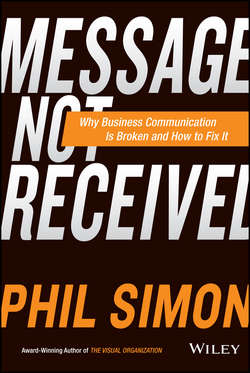Читать книгу Message Not Received - Simon Phil - Страница 12
На сайте Литреса книга снята с продажи.
PART I
WORLDS ARE COLLIDING
Introduction
The Intersection of Business, Language, Communication, and Technology
What’s the Big Whoop?
ОглавлениеYou may think that relying on jargon and excessive e-mails is just par for the course. What’s the big deal, anyway?
Several reasons readily come to mind. The first is that, as mentioned earlier, the need for clear, concise, and context-appropriate communication has never been more pronounced. As Chapter 2 demonstrates, employees are inundated with messages throughout the day, many of which arrive via confusing or inscrutable e-mails. Which of the following do you think is more likely to be effective?
● An endless chain of baffling, jargon-laden e-mails
● Simple, clear, and honest conversations either in person or via a truly collaborative tool
For a long time now, people have denounced the use of buzzwords when plain English would suffice. Yet jargon persists. The critics are helpless against “words” like incent. Beyond that, business folks turn nouns into verbs. In reality, they’re only bloviating. (The now commonplace adoptions of use case15 and price point are real pet peeves of mine.) They fail to consider the context of what they’re saying, and they speak and write with zero regard for their audiences.
Second, you may believe that new times have always required new words and phrases. This is true, but not to the same extent currently exhibited. The verb “to Google” developed organically. Millions of people quickly understood what it meant. But what about horrible and contrived phrases such as Next-Generation Big Data Platform as a Service? Can we honestly make the same case here?
If technology were a fleeting trend, then perhaps we could excuse the growing use of jargon, the e-mail deluge, and bad business communication in general. Unfortunately, it isn’t and we can’t. Technology is permeating every instance of our lives – and not just in the workplace. The Internet of Things is arriving as we speak. Every company is becoming a tech company; some of them just haven’t realized it yet. Few employees work in tech-free zones.
15
Although many people currently use the two terms interchangeably, a use case is not a synonym for use. Rather, the former is a formal software and system engineering term describing how users use systems to accomplish particular goals. A use case defines the features to be implemented and the resolution of any errors that may be encountered. See http://tinyurl.com/kg38mu7.
